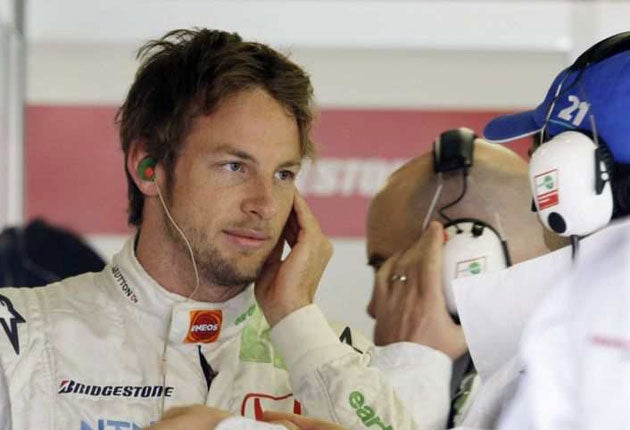Honda pull out of 2009 competition
Budget cuts in Japan as recession bites leave Button in search of F1 drive

Your support helps us to tell the story
From reproductive rights to climate change to Big Tech, The Independent is on the ground when the story is developing. Whether it's investigating the financials of Elon Musk's pro-Trump PAC or producing our latest documentary, 'The A Word', which shines a light on the American women fighting for reproductive rights, we know how important it is to parse out the facts from the messaging.
At such a critical moment in US history, we need reporters on the ground. Your donation allows us to keep sending journalists to speak to both sides of the story.
The Independent is trusted by Americans across the entire political spectrum. And unlike many other quality news outlets, we choose not to lock Americans out of our reporting and analysis with paywalls. We believe quality journalism should be available to everyone, paid for by those who can afford it.
Your support makes all the difference.Honda yesterday became the first Formula One team to fall victim to the global recession. Staff were called into the factory for a meeting late in the day in which team principals Ross Brawn and Nick Fry announced that the team would not compete under the Honda Racing name in the 2009 Formula One world championship.
Suspicions had been aroused earlier in the week when an annual media lunch at the opulent Le Manoir aux Quatre Saisons near Oxford was cancelled at less than 36 hours' notice.
Brawn and Fry told the stunned staff that there was only sufficient budget from the Honda factory in Tokyo to continue to operate for another three months. In that time the production of the new car that should have been raced next year by Britain's Jenson Button will be completed and he is expected to test it as if everything was normal. The medium-term plan is to find a buyer in that period of grace who will carry on the team under a different name. This is likely to be an extremely difficult task, given the worldwide difficulties created by the current economic climate.
The news has rocked Formula One circles. Honda appeared to be recession-proof, but only recently they lost 32 per cent of their sales in the vital American market. That sounded all the alarm bells in Tokyo, where the decision to withdraw was quickly taken. Official confirmation of that is expected this morning.
There are serious concerns that other manufacturers may be obliged to follow suit. Toyota spend more than $400m (£275m) per season and have yet to score a victory. They too have suffered serious sales losses, of 34 per cent, in the US market, and may feel that a similar strategy is necessary. Even before the recession, there were rumours that the company might hand over their costly operation to the Williams team, who use their engines. This could still happen, cutting Toyota's costs but enabling it to keep a toe in the Formula One water.
The Honda founder Soichiro Honda had racing in his blood and, having raced cars himself in the Twenties and Thirties, took his company into postwar motorcycle racing first, then into cars. Honda first entered Formula One in 1964 and scored their first victory with Richie Ginther in Mexico City in the final race of the 1.5-litre Formula One in 1965. John Surtees earned their second win in the 1967 Italian Grand Prix at Monza in the second year of the 3-litre formula that followed, but at the end of 1968 Honda were obliged to pull out for the first time to focus engineering development on meeting tough new emission control legislation that affected their road cars.
They came back officially in 1984 with the Williams team after backing Spirit Racing in 1983. Keke Rosberg scored their first victory in Dallas in 1984, and further victories followed for Rosberg and an emergent Nigel Mansell in 1985. In 1986 Mansell fought for the world championship with new team-mate Nelson Piquet; though Alain Prost won the drivers' title for McLaren, Williams-Honda won the constructors. The following year they repeated the achievement, as Piquet won the drivers' crown.
A switch to McLaren in 1988 saw Honda dominate through until 1991, with Ayrton Senna scoring all three of his world championships at the wheel of a McLaren-Honda, and Prost his third title.
Williams fought back with Mansell and Renault power in 1992, and Honda withdrew for the second time at the end of that season. They came back a third time in 1999 with the new BAR team, having decided against running their own operation. BAR became Honda at the end of 2005, but this was their least successful period, with Button's maiden victory in the 2006 Hungarian Grand Prix proving the one high point, though BAR-Honda had finished second to Ferrari in the 2004 constructors' championship.
Button, who was on a lucrative long-term contract with the team, is unlikely to find a top drive at this late stage, but will undoubtedly be of interest to the Toro Rosso team as they seek to replace the Italian GP winner Sebastian Vettel, who has moved to Red Bull.
Join our commenting forum
Join thought-provoking conversations, follow other Independent readers and see their replies
0Comments